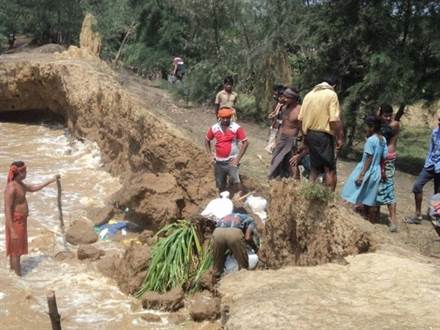
We want to upscale our impact to build community resilience!
-
Climate and disaster risks
-
Coastal resilience
-
Community resilience
-
Integrated delta management
At today’s International Day for Disaster Risk Reduction, Wetlands International celebrates its five-year collaboration with Netherlands Red Cross, Red Cross/Red Crescent Climate Centre, Cordaid, and CARE NL to build community resilience in developing countries. We are thrilled that the Partnership will continue for another five years in a strategic partnership with the Dutch government, focusing on civil society capacity building for lobbying and advocacy in five disaster prone regional zones such as the Horn of Africa.

In the past five years the Partners for Resilience (PfR) collaborated with 60 local civil society organisations to improve the resilience of over half a million vulnerable people in nine countries by addressing root causes of disasters. PfR’s unique approach integrates climate change adaptation and ecosystem management and restoration into disaster risk reduction, which we call ‘integrated risk management’. The partners helped communities assess the risks they face and implement risk-reduction measures.
Multiplying and upscaling our approach

In the next phase, the PfR Alliance aims to scale up its field demonstration projects – at nation-wide regional and global level. The central aim is to engage with governments, institutional donors, and decision-makers to influence policies and plans, investment mechanisms and practices towards integrated approaches for risk management.
This will be done together with and through other civil society organisations in ten focal countries, being Ethiopia, Guatemala, Haiti, India, Indonesia, Kenya, Mali, Philippines, South Sudan and Uganda and 5 regions, namely Horn of Africa, Inner Niger, Central America, South-East Asia and South Asia.
Unfortunately many local CSO’s face a shrinking political space for civil society in their country and struggle to effectively engage in policy processes. Wetlands International and its partners will therefore help CSO’s to establish round tables and other dialogues to effectively support development and implementation of policies and legislative frameworks and facilitate a connection with practice on the ground.
Integrating ecosystems in resilience policy, practice and investments
Supporting these dialogues Wetlands International will facilitate capacity building on ecosystem?based risk management in their respective socio?economic and political context, support development of organizational advocacy strategies and facilitate development of regional civil society networks on ecosystem?based risk reduction.
Wetlands International will focus on:
- Policies to include ecosystem-based approaches in risk management and address root causes to risk that result from ill?informed sectoral developments.
- Field-based programs integrate ecosystem-based, humanitarian and engineered risk management solutions.
- Investments in ecosystem-based risk management and inclusion of safeguards towards sustainable risk reduction practice. This involves both finance for risk reduction and broader sectoral investments.
The number of natural and man-made disasters has been growing dramatically over the past few decades, with climate change contributing to even more extreme or unpredictable weather. The degradation and loss of ecosystems intensify the hazards that, combined with the high vulnerability of communities in the global South, lead to increased disaster risks.
